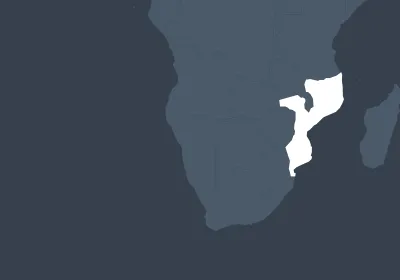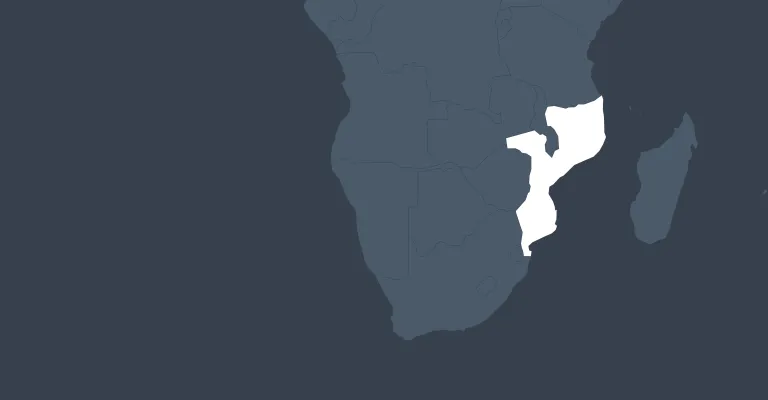
Mozambique
| PR Political Rights | 12 40 |
| CL Civil Liberties | 29 60 |


The ruling Front for the Liberation of Mozambique (FRELIMO) has maintained unbroken incumbency before and since the first multiparty elections in 1994, allowing it to establish significant control over state institutions. The opposition has disputed the results of recent elections, with severe postelection violence erupting in 2024. Hundreds of thousands of people have been internally displaced due to an ongoing Islamist insurgency in Cabo Delgado, but some of them are returning as a result of increasing security. Mozambique also struggles with corruption, and journalists who report on it and other sensitive issues risk violent attacks.
- General elections held in October were characterized by credible fraud allegations and postelection violence lasting for weeks. Opposition demonstrations erupted into rioting, and the police response featured arbitrary arrests, lethal violence against demonstrators, and abuses against journalists and civil society members that drew condemnation from rights groups. The civil society monitoring group Plataforma Decide reported in late December that 252 people had been killed since unrest erupted in October.
- In December, the Constitutional Court validated election results showing that Daniel Chapo of FRELIMO won the presidential election with 65 percent of the vote, defeating opposition candidate Venâncio Mondlane, who was backed by the relatively new Optimist Party for the Development of Mozambique (PODEMOS), now the country’s main opposition party. Official results also showed FRELIMO increasing its parliamentary majority. Violent clashes between police and protesters again erupted following the court’s decision.
- Two prominent opposition figures—Elvino Dias, a lawyer and advisor to Mondlane, and PODEMOS spokesperson Paulo Guambe—were assassinated days after the general elections. They were gunned down in their vehicle as PODEMOS was preparing to formally challenge the presidential election results.
- Digital rights groups reported internet shutdowns in Mozambique during the postelection unrest, noting that the shutdowns hampered business activity, online school, information-sharing about the elections, peaceful assembly, and ordinary everyday communication. The country’s communications regulatory body did not offer any legal justification for the shutdowns.
- In August, former Finance Minister Manuel Chang was convicted by a US court of conspiracy to commit wire fraud and conspiracy to commit money laundering. The so-called Tuna Bond scandal left Mozambique some $2 billion in debt, and was described by some media as among the worst corruption cases on record in Africa.
- In March, the parliament ratified an extradition treaty with Rwanda despite concerns that Kigali could use it to persecute Rwandan refugees and asylum seekers in Mozambique.
This report has been abridged for Mozambique due to ongoing budget constraints. Freedom in the World is entirely funded by nongovernmental sources such as private foundations, corporations, and individuals like you. Please consider making a donation to support future editions of this vital resource.
For additional background information, see last year’s full report.
| Was the current head of government or other chief national authority elected through free and fair elections? | 1.001 4.004 |
| Were the current national legislative representatives elected through free and fair elections? | 1.001 4.004 |
| Are the electoral laws and framework fair, and are they implemented impartially by the relevant election management bodies? | 1.001 4.004 |
| Do the people have the right to organize in different political parties or other competitive political groupings of their choice, and is the system free of undue obstacles to the rise and fall of these competing parties or groupings? | 1.001 4.004 |
Score Change: The score declined from 2 to 1 because lethal police violence against opposition protesters and the assassination of two opposition figures severely hampered the functioning of opposition parties following disputed elections.
| Is there a realistic opportunity for the opposition to increase its support or gain power through elections? | 1.001 4.004 |
| Are the people’s political choices free from domination by forces that are external to the political sphere, or by political forces that employ extrapolitical means? | 1.001 4.004 |
Score Change: The score declined from 2 to 1 because political violence increasingly limits normal participation in political life.
| Do various segments of the population (including ethnic, racial, religious, gender, LGBT+, and other relevant groups) have full political rights and electoral opportunities? | 2.002 4.004 |
| Do the freely elected head of government and national legislative representatives determine the policies of the government? | 1.001 4.004 |
| Are safeguards against official corruption strong and effective? | 1.001 4.004 |
| Does the government operate with openness and transparency? | 2.002 4.004 |
| Are there free and independent media? | 2.002 4.004 |
| Are individuals free to practice and express their religious faith or nonbelief in public and private? | 3.003 4.004 |
| Is there academic freedom, and is the educational system free from extensive political indoctrination? | 2.002 4.004 |
| Are individuals free to express their personal views on political or other sensitive topics without fear of surveillance or retribution? | 2.002 4.004 |
| Is there freedom of assembly? | 0.000 4.004 |
Score Change: The score declined from 1 to 0 due to a disproportionately violent response by police to opposition demonstrations that took place during a period of postelection unrest.
| Is there freedom for nongovernmental organizations, particularly those that are engaged in human rights– and governance-related work? | 2.002 4.004 |
| Is there freedom for trade unions and similar professional or labor organizations? | 2.002 4.004 |
| Is there an independent judiciary? | 2.002 4.004 |
| Does due process prevail in civil and criminal matters? | 2.002 4.004 |
| Is there protection from the illegitimate use of physical force and freedom from war and insurgencies? | 1.001 4.004 |
| Do laws, policies, and practices guarantee equal treatment of various segments of the population? | 2.002 4.004 |
| Do individuals enjoy freedom of movement, including the ability to change their place of residence, employment, or education? | 3.003 4.004 |
| Are individuals able to exercise the right to own property and establish private businesses without undue interference from state or nonstate actors? | 2.002 4.004 |
| Do individuals enjoy personal social freedoms, including choice of marriage partner and size of family, protection from domestic violence, and control over appearance? | 2.002 4.004 |
| Do individuals enjoy equality of opportunity and freedom from economic exploitation? | 2.002 4.004 |


Country Facts
-
Population
32,970,000 -
Global Freedom Score
41 100 partly free
